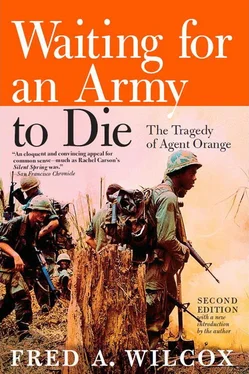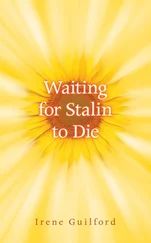One of the early ploys which the Veterans Administration used to avoid paying service-connected disability to victims of Agent Orange was to argue that veterans could not really prove they were exposed to herbicides in Vietnam. The Department of Defense also used this argument to discredit veterans’ claims of cancer and birth defects due to exposure to Agent Orange. In testimony before the Committee on Veterans’ Affairs, United States Senate, Major General William S. Augerson, at the time deputy assistant secretary of defense, argued a retrospective epidemiological study of Vietnam veterans. Because there “are generally no data exposure concentrations and exposure times,” said Augerson, the results of such a study would be “highly unreliable.” Given the existence of HERBS tapes that constitute a computerized record of the time, date, place, and amount of herbicide sprayed, the major general’s statement would appear at best based upon bureaucratic rhetoric. And had he attended any of the hearings that are being held throughout the country on the problems and perils of dioxin exposure, he would have heard hundreds of veterans testify that they were exposed to Agent Orange in Vietnam. For example, a veteran who had served with the First Aircraft, Air Mobile, told the New York State Temporary Commission on Dioxin Exposure: “After the LZ [landing zone] was sprayed, we walked around the perimeters, strung barbed wire all around it. Then we sat down, the helicopters flew in, and this stuff was blowing all over the place. Most of us drank out of bomb craters, showered in bomb craters. All the guys know about that. That’s the only time we could wash up. And all that water was polluted with Agent Orange.”
Clark spreads the form letters denying him service-connected disability payments for his bladder cancer on the table, and waits while I examine them. They are succinct, designed to make the readers feel hopeless, as though appealing the decision would be a folly. There is no “Thank you for serving your country.” Or “We are sorry you are suffering and only hope that, once further research is done into this matter, we can be of help.” Nothing to soften the blow. Just flat denial. In one letter, however, the VA does elaborate on its reason for rejecting Clark’s request for disability. The letter reveals that while undergoing an examination Clark once fainted and that this has led the VA to conclude that he just might have a “hysterical personality.” That he might have lost consciousness because his body was reacting to a serious assault from cancer seems not to have occurred to the Veterans Administration. “They think we’re all nuts,” said one veteran. “And if they can prove that, then they don’t really have to help us. And they claim we’re just looking for pity or a fast buck.”
“But even if the VA hospitals were really interested in helping veterans of what they insist on calling the ‘Vietnam era’—they refuse to call it a war—they couldn’t do it because they don’t have the facilities or the staff,” Clark says, tossing the rejection letters into a folder. “They couldn’t do it because last year the Syracuse VA Hospital lost half of its staff and millions of dollars in funding, and it’s just one part of a rapidly deteriorating system. They don’t have any facilities for testing you for exposure to toxic chemicals, and even if Congress orders them to treat us with respect, to give so-called Agent Orange examinations, the VA hospitals will continue to attract incompetent staff, and it would take a monumental effort for them to get veterans to trust the VA again. But assuming they make that effort and manage to get the veterans whom they’ve alienated to return for tests, they would have to do 2.9 million fat biopsies at a cost of billions of dollars. Given our rank on the ‘fiscal priority list’ it is unlikely that the tests will ever be run.”
Like nearly all of the men and women who served in Vietnam, Ray Clark was in top physical condition when he entered the service; and like every veteran with whom I’ve spoken or heard testify at state-sponsored hearings into dioxin exposure, he can recall little if any illness before he went to Vietnam. Before the war, veterans say, they never suffered from skin rashes, weakness of limbs, nervous disorders, liver disease, heart murmurs, cancer, loss of libido. Ten years after their return from Asia, they are aging with frightening rapidity, afraid for themselves, their children, and their childrens’ children. And in their attempts to find answers, to explain the tragedy that has befallen them and their children, they research through their family trees to discern if there might be a pattern of cancer or birth defects in their lineage. Quite often they discover, as Ray Clark and his wife discovered, that no pattern exists.
“When I got out of high school I was in perfect health, and there is no history of cancer in my family. And what amazes me is that out of the millions of men who went to Vietnam, a sizable percentage now have health problems. Most of these men are in the thirty-five-year-old age bracket, the prime of life, and yet their problems are severe, and quite often rare from a medical point of view. Ed Juteau, vice president of Agent Orange Victims International, died of lymphatic cancer, and after his death the VA cut off payments to his wife and son because the VA claims he died of ‘kidney failure.’ In the past few years I’ve met veterans with cancer of the colon, testicular cancer, liver dysfunctions, heart ailments, veterans whose children were born with as many as sixteen birth defects. And yet for so long no one was willing to do studies to determine just what is causing all these problems. They’ve studied rats, mice, rabbits, chickens, and monkeys, and found that dioxin gives them cancer, causes their death, deforms and kills their offspring. But all this doesn’t apply to us. Well, no one has ever shown that dioxin didn’t poison us. And we know that shortly after they began spraying Agent Orange in Vietnam the chemical companies sent a letter to the government advising them that there could be health problems from the herbicide. But of course the government doesn’t want to admit that the stuff they were spraying on people was 2,000 percent—almost twenty times—more contaminated by dioxin than the domestic 2,4,5-T that was banned in 1979 by the Environmental Protection Agency. Some of the stuff sprayed on Nam was 47,000 percent more contaminated. And they sprayed it over and over on the same areas. What the government doesn’t want to admit is that it is responsible for killing its own troops.”
Clark explains that he has dropped out of most of the lawsuits in which he had been a plaintiff following his operation for bladder cancer. And since the Veterans Administration has never notified eligible claimants of favorable changes in benefit rules, it is unlikely that he will hear from the VA again, even if he is ruled eligible for disability payments.
“I don’t need the money,” he says. “Money isn’t going to do me any good. What I really want to see is the money used to create a government agency, or should I say a governing agency, that would stop them from experimenting with radiation and herbicides. I don’t care about winning a million dollars. My health, which is the most important thing a person can have, is gone now. It’s all in my past. I just don’t want the same thing to happen to my children that has happened to me. I volunteered for the military, and through some quirk of fate I got sent to Vietnam, but once I got there I didn’t have any choice about being subjected to herbicides and other dangerous chemicals. And I resent that. I want the system changed so that we’re not guinea pigs, and so we don’t let the government, or anyone else, do this again. Every time I walk into the Veterans Hospital in Syracuse, I see this quote from President Lincoln: WE SHALL TAKE CARE OF THE WIDOWS AND CHILDREN OF THOSE WHO SERVED. Well, they’re not. They have completely forgotten about us. I think they’re just waiting for all of us to die, and then someone can say, ‘Oh, dear, maybe we did make a mistake with this Agent Orange.’ At the rate things are going they won’t have to wait very long.”
Читать дальше











